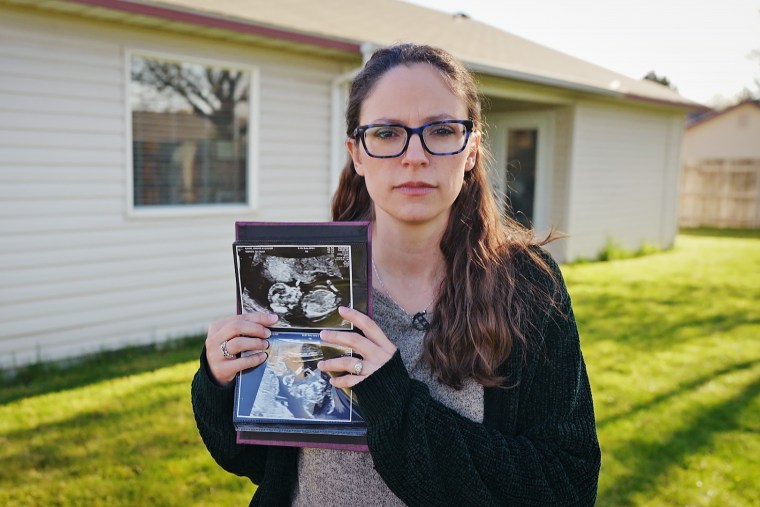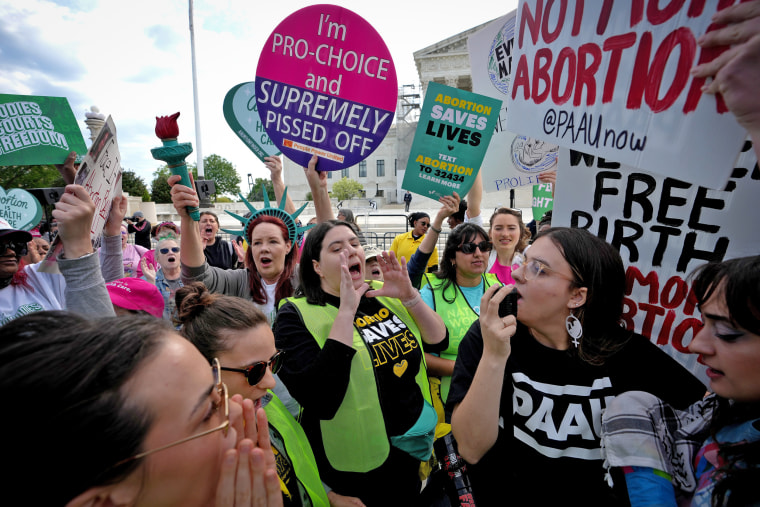BOISE, Idaho — It was the news that every expectant mother dreads. Twelve weeks pregnant with her second child, Jennifer Adkins learned her developing fetus had Turner syndrome, a rare chromosomal abnormality, and was unlikely to survive. On top of that, doctors warned that her own health could be in jeopardy.
Adkins was at high risk of what’s known as Mirror Syndrome — a condition in which the pregnant mother develops symptoms that mimic those of her deteriorating fetus, including swelling, high blood pressure and potentially pre-eclampsia.
But when she raised the prospect of terminating the pregnancy with her doctors, Adkins learned it was not an option: The fetus still had a heartbeat.
“They said we’re surprised that you’re still pregnant, given the severity of what we’re seeing on ultrasound. Most people would have miscarried by now,” she said. “I was just in total, total shock.”

Idaho is one of more than a dozen states that have banned nearly all abortions. Anyone who performs an abortion here is subject to up to five years in prison, and medical professionals who violate the law can also lose their licenses.The law provides an exemption if a doctor finds the procedure is necessary to prevent the death of the woman. But doctors in Idaho say there’s significant confusion about what to do when a patient is carrying a fetus that is not viable and could cause devastating complications, but she is not on the brink of death.
“It makes no sense that we’re just going to wait until you’re on death’s door and then we’ll act,” said Dr. Duncan Harmon, one of only five full-time doctors specializing in maternal fetal medicine who remain in Idaho.
The bind in which some Idaho doctors find themselves is at the heart of a lawsuit the U.S. Supreme Court must now consider. The justices heard oral arguments Wednesday and will decide whether the state’s abortion ban conflicts with a federal law that requires hospitals receiving federal funding to provide patients whatever treatment is necessary, including abortions, to stabilize them in emergencies.

In their questions, several of the liberal justices raised examples of medical complications — such as the premature rupture of membranes — that could pose serious bodily injury if not immediately addressed but would not necessarily be fatal.It’s not the only legal challenge to Idaho’s law: Adkins has brought a lawsuit against Idaho in state court, along with three other women and two doctors, asking the court to clarify the scope of the state’s abortion ban. A trial is tentatively set for later this year.
In Adkins’ case, waiting to miscarry naturally could have taken weeks. So she and her husband, John, packed their bags, cobbled together funds and drove six hours to Oregon for an abortion.
“We were both disgusted by the treatment of our state,” she said. “Not only did we have to go through the trauma and grief of losing a very wanted baby, but then we had to have this emotional trauma of traveling to get the procedure.”
Asked about Adkins’ lawsuit Wednesday, Idaho Attorney General Raúl Labrador, a Republican, said the law is “very clear.”
“The law in Idaho protects unborn children and protects the life of the mother, and any instance where the life of mother’s in jeopardy, [abortion] will be allowed by the state of Idaho,” he said.
But Gail Deady, a senior staff attorney for the Center for Reproductive Rights, the legal advocacy group representing Adkins, said she does not think “most doctors in Idaho have an understanding of where that line is.”
Harmon said it’s an approach that contradicts medical training.
“The idea of not acting, which might hasten the clinical situation to worsen, so that we can act only at the very end is counterintuitive to anything in medicine that I know,” he said.
Even if an expectant mother is not on the verge of death, said Dr. Sara Thomson, an OB-GYN in the Boise area, it can still be heartbreaking to deny her the ability to end a pregnancy if she has a medical complication that means the baby is not going to survive.
“Having her stay pregnant for hours or days longer, until she’s in a situation where we can declare her medical condition life-threatening, does nothing to benefit the baby and only harms the mother,” she said, adding, “We are adding trauma onto a situation that’s already traumatizing, and to feel like our hands are tied by a state legislature who doesn’t understand this clinical detail is super frustrating.”
In the 15 months after Idaho’s abortion ban went into effect in August 2022, Idaho lost 22% of its 268 OB-GYNs, according to a report from the Idaho Physician Well-Being Action Collaborative.
Because of that, Thomson said, “even if you don’t have any complications, you may find yourself in a situation where you are having to drive many miles, more than an hour, to have a prenatal visit or to deliver your baby.”
Thomson added that she, too, updated her résumé recently — for the first time in 10 years.
Harmon, however, said he plans to stay, at least for now.
“Those of us [who] are left are kind of thinking … we got to stick around, because if we don’t, who will?“ he said.
Adkins is pregnant again in a state that she feels has already failed her once.
“It’s scary, and it continues to get scarier,” she said. “Just knowing what the state of maternal care is in our state right now, it’s like walking on eggshells.”
